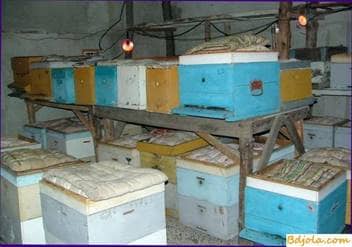Bees in winter huts are better

Wintering bees at will is economically advantageous, since there is no need to build winterers and in unnecessary laborious work for placing bees in them. Bees used to fly over, more viable. Practice has proved that bees are free to winter successfully when there is a lot of snow on the apiary, when the ventilation in the hives is properly regulated, when they have enough forage and they are of excellent quality in winter.
In the conditions of the Middle Volga region, when environmental conditions are constantly deteriorating, when industrial enterprises pollute the environment with waste, and collective farms and state farms with herbicides and pesticides, we are increasingly forced to give preference to winterers. We have good reasons for this. We will analyze each separately.
The first and most important: in the Saratov region to control weeds and pests used a huge amount of pesticides and herbicides, not counting the excess fertilizer. All this falls into the nectar, and hence, into honey. Wintering bees at will on such a stern leads to a sharp weakening of families, outbreaks of nosematosis and other diseases, often to death; in a warm room, they eat fodder for two to three kilograms less during the winter, in addition, at elevated temperatures, many pesticides in fodder honey are quickly neutralized, losing their toxic properties.
The second reason: wintering on honey from sunflower – our main medon. The whole trouble with this honey is that during the wintering of bees in the wild, it quickly and too densely crystallizes. However, in warm winterers, the sunflower honey begins to crystallize for a whole month later, and this is a big plus. In families in winterers, it often has a watery grainy consistency, and this allows bees to use it by about 70%. Of course, you can replace some honey with sugar, but it often does not.
In addition, many years of observations
And another reason – the instability of winter weather, characterized by frequent thaws, and often rains. Snow cover in our country is also insignificant, and when it thaws completely. Therefore, the wintering of bees under snow is impossible under our conditions.
It is known that in the case of sharp fluctuations in winter temperatures in families that winter in the wild, brood appears very early. In unfavorable conditions, this greatly exhausts and wears out bees, causing a significant weakening of families and outbreaks of nosematosis. Conversely, the appearance of the late brood in April is always encouraging, as the bees compensate for this delay in the laying of the queens, and families are gaining strength and are surpassed in development by those in which brood appeared, say, in March or even in February.
All these reasons make beekeepers prefer wintering families of bees in the premises. Winterers should be warm, able to maintain throughout the winter a smooth temperature without fluctuations, with good supply and exhaust ventilation.
Bees in winter huts are better
